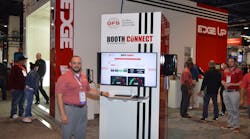“Finding a coating that can consistently perform year after year, in a variety of different scenarios, and still withstand the damage that Mother Nature has to offer, is key to any paint line,” says Nick Dowling, assistant product manager, Martin Senour Automotive Finishes (www.martinsenour-autopaint.com). When refinishing a vehicle, look for products that “offer the right blend of durability, productivity and ease of use that can be the right fit for any painter, manufacturer or refinishing facility.”
Martin Senour develops, manufactures and distributes a complete portfolio of high-quality coatings and supplies for various automotive, fleet and manufacturing refinishing segments, and is the exclusive supplier of automotive refinish products to NAPA.
ADHESION
“In order to ensure a successful paint job, the surface preparation step is crucial,” Dowling points out. “Improperly prepared surfaces can reduce the integrity of even the most high-end coating.
“Ultimately, surface preparation helps improve the probability that a paint job will adhere properly. The majority of coatings failures can be directly attributed to inadequate surface preparation, which affects coating adhesion.
To ensure adhesion of the coating to the substrate and prolong the service life of the coating system, he recommends selecting and implementing the proper surface preparation. “The method of surface preparation depends on the substrate, the environment and the expected life of the coating system.”
CAREFUL CONSIDERATION
Dowling explains that there are key differences between stage and basecoat/clearcoat paints.
“Outside of chemistry differences, stage and basecoat coatings require careful consideration when selecting a paint system. Each paint job is as unique as the make and model of the unit being refinished.
“Stage coatings are robust in the sense that they are designed to produce an ‘all-in-one’ coating. They can reduce inventory and the steps needed to complete a paint job.
“With that being said, stage coatings must produce adequate film build, coverage, gloss, color and durability that meet industry standards. They are not always the answer, so evaluating each paint job separately is very important.”
For superior color matching, metallic control and producing a high-gloss finish, “basecoats are necessary,” says Dowling. “Unlike single stage products, basecoat/clearcoat systems do not need to be applied as heavy to impact the durability or final gloss level. The clearcoat step in this process accounts for nearly all of the durability and final gloss level.
“That means metallic control and color matching in a basecoat are superior to that of single stages.”

